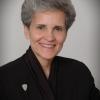Recently I attended a lecture on the topic of inclusiveness in healthcare in the United States. Among the speaker’s points were references to immigration – that people coming to the emergency room won’t say where they live for fear of being picked up; and the speaker also referenced racial issues – that past discriminatory treatment still creates fear.
The speaker challenged, “Because the U.S.A. is the greatest, richest and most powerful country in the whole world, why aren’t we the most inclusive? Why don’t we have work forces that look like the people we serve?”
The speaker, who was a native of India, spoke English fluently but somewhat hurriedly and without clear enunciation. At one point he said, “We cannot let our guard down.”
My aging ears heard instead, “We cannot let our God down.”
[Sr. Nancy Linenkugel is a Sylvania Franciscan sister and chair of the department of Health Services Administration at Xavier University, Cincinnati, Ohio.]
Then I began to think about what he really said and what I thought he said.
The phrase, “Love is Blind” came to mind. Love really must be blind. I look at you and see someone different than me – skin color, hair color, size, age, etc. As sighted persons, we make thousands of instantaneous judgments about each other every day. Wouldn’t it simply be easier to be blind and not see differences? Acceptance and appreciating others would hinge on nothing but the fact that we’re both human beings.
No, we cannot let our God down.
[Sr. Nancy Linenkugel is a Sylvania Franciscan sister and chair of the department of Health Services Administration at Xavier University, Cincinnati Ohio.]
